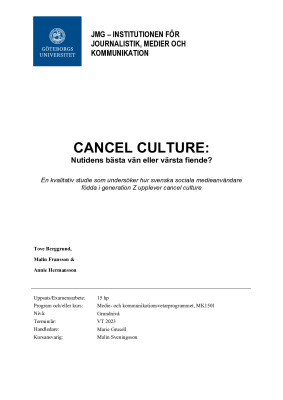CANCEL CULTURE: Nutidens bästa vän eller värsta fiende?
En kvalitativ studie som undersöker hur svenska sociala medieanvändare
födda i generation Z upplever cancel culture
Executive summary
Digitisation has had tremendous effects on both individuals and society. The people who use social media and consume content on these platforms are exposed to both positive and negative side effects, but they also have the opportunity to influence what is actually published. This can be seen as a great freedom, which to some extent it is, but it is also something that can include serious consequences, both at a societal and individual level. In this regard, it is mainly public figures who are exposed to possible criticism for what they choose to publish on their social channels. Problematic statements, immoral actions or, in the worst case, breaking the law, can result in the person who performed the action, ending up being so-called cancelled.
Cancel culture is a relatively new concept on social media although it is an old phenomenon, which can lead to an uncertain definition of the conception. The aim of this paper was to investigate how users on social media platforms define, justify and value cancellation. Through a qualitative research method, we have conducted interviews to find out how young Swedish social media users, belonging to generation Z, view cancel culture as a phenomenon, but also cancellation as a concept. The previous research on cancel culture is relatively unexplored, which means that there are large research gaps to fill. In this essay, we examine cancel culture from a Swedish perspective and thus fill one of the current research gaps. The results we obtained based on our interviews show that the concept of cancellation is diffuse and that it is largely about how the individual himself values the content that is
published.
The reasoning around when someone should be canceled was also somewhat unclear. To a large extent, the respondents agreed that the limit for cancellation is when the law is broken. In contrast, it
was more diffuse when it comes to whether someone performed immoral acts, where it was again a more subjective interpretation. The respondents’ values regarding cancellation with consideration to its
advantages and disadvantages were investigated and there, too, the respondents were largely in agreement. The benefits mainly consisted of the fact that the respondents considered it positive that the
individuals who commit mistakes should be punished. Disadvantages, according to respondents, consisted mainly of the fact that they believe there is a risk of individuals being subject to cancellation
on false grounds – much due to false rumors being spread about these individuals on social media.
Based on our results, we analyzed the respondents’ answers and then connected them with the two chosen theories; consumer cancel culture framework (Saldanha et al. 2020) and Stuart Hall’s encoding/decoding theory (Shaw, 2017). During our analysis part, we also brought in our own thoughts and ideas. During the analysis we used Hall’s theory encoding/decoding (Shaw, 2017) which can be implemented on how the respondents believe they define cancellation. Hall’s theory is based on
how a person’s previous experiences play a role in how they interpret and receive information or content on social media, and thus define cancellation. Based on the results and the analysis, we then held a discussion about the phenomenon of cancel culture and cancellation, where we discussed whether our results have been answered in relation to the empirical questions of the work – which we believe it has.

